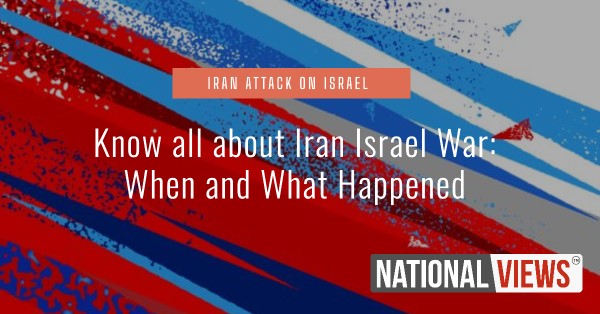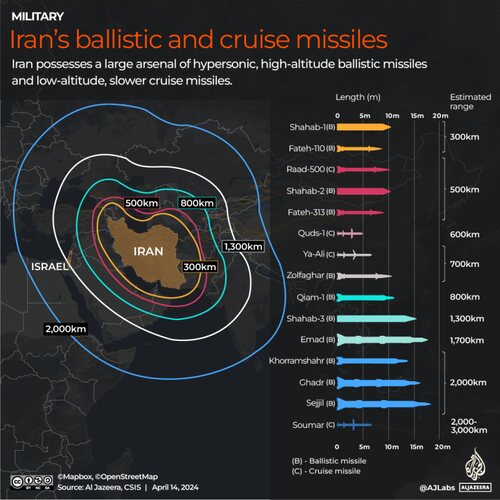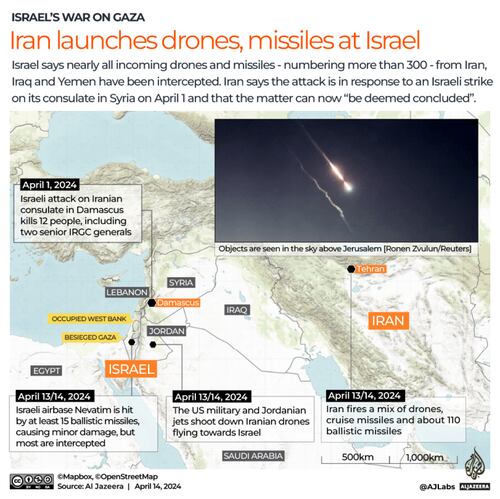Iran has attacked Israel with a massive barrage of over 300 drones and missiles, in what is believed to be Iran’s first major attack on Israel. Here we share all about Iran Israel War – when did it happen, what was the reason for Iran attacking Israel, what is the Israeli government saying and what can happen next.
Iran Attacks Israel: What occurred in Israel and when?
- Iran initiated a massive aerial assault on Israel on April 14, 2024, occurring two weeks after a suspected Israeli strike on its consulate in Syria (April 1, 2024) . This marks Iran’s first direct attack on Israeli territory from Iranian soil, named Operation True Promise by Iran.
- The attack commenced on Saturday night around 20:00 GMT and persisted for roughly five hours as per US officials.
- Explosions reverberated in cities across Israel during the attack, including Tel Aviv and Jerusalem. Air raid sirens blared in over 720 locations as Israeli forces endeavored to intercept the incoming projectiles.
- According to a report by The Associated Press news agency, Daniel Hagari, Israel’s chief military spokesman, disclosed that Iran’s attack comprised over 120 ballistic missiles, 170 drones, and more than 30 cruise missiles.
- The Israeli military noted that most of the projectiles were intercepted outside the country’s borders with assistance from the United States, United Kingdom, and France. Jordan also downed some missiles in its airspace aimed at Israel.
- Israel’s military confirmed a “small number of hits” and reported minor infrastructure damage at a southern Israel base.
- A seven-year-old girl suffered severe injuries from missile fragments, while other patients sustained minor injuries and some were treated for anxiety.
- US Defense Secretary Lloyd Austin announced on Saturday that the US intercepted “dozens” of missiles and drones launched from Iraq, Syria, and Yemen targeting Israel.
Iran Israel War: Where Did the Iran attacks Take Place in Israel?
Explosions were heard in cities across Israel, including Eilat, Israel’s southern Red Sea port, which has suffered from a sharp decline in operations because of repeated attacks by Yemen’s Houthis on ships passing through. The Israeli military added that a “small number of hits were identified” in a tweet after the attacks.
During the assault, Israel’s military instructed residents in the northern Israeli-occupied Golan Heights – close to the Syrian and Lebanese borders – and in the southern cities of Nevatim, Dimona, and Eilat to stay near bomb shelters.
Nevatim houses an Israeli airbase, while Dimona hosts a nuclear reactor on its outskirts. Eilat serves as Israel’s southern Red Sea port, facing operational challenges due to frequent attacks by Yemen’s Houthis on ships navigating through the waterway.
Also Read: Yemen Civil War: 10 Facts You Need To Know
How Did the United States Help Israel in Repelling the Iranian Attack?
The United States played a crucial role in assisting Israel in thwarting the Iranian attack by providing support that enabled Israel to successfully repel the missile and drone assault. The U.S. aided Israel in intercepting over sixty drones and missiles launched by Iran, marking the first direct military attack on Israeli soil. U.S. officials highlighted Iran’s intent to cause destruction and casualties, emphasizing the seriousness of the threat.
Image Credits – Al Jazeera
The U.S. Central Command and European Command forces destroyed over 80 attack drones and at least six ballistic missiles intended for Israel. President Joe Biden reaffirmed U.S. support for Israel and condemned Iran’s actions during a call with Israeli Prime Minister Benjamin Netanyahu. Additionally, the U.S. administration assured Israel of its unwavering commitment to Israel’s security and defense, indicating that the U.S. would respond similarly in the event of another attack.
Why Did Iran attack Israel?
The Iranian attack targeted Israeli territory from Iranian soil and lasted approximately five hours, according to US officials. The target of the attack was Israeli military installations within its borders. Iran launched over 300 drones and missiles against Israeli military targets, marking an unprecedented attack, according to President Joe Biden.
Image Credits – Al Jazeera
This response came after an Israeli strike on Iran’s embassy compound in Damascus, Syria, which killed seven Iranian military personnel. The attack was a retaliation for a suspected Israeli strike that killed an Iranian military commander, Major-General Mohammad Reza Zahed, in Damascus on April 1. At least six Syrian citizens were also killed.
What is the Israeli Government Saying?
Israeli Prime Minister Benjamin Netanyahu expressed confidence in his country’s resilience, tweeting “we will win” after the attacks.
Earlier, he addressed the nation, emphasizing that the military was fully prepared for any scenario.
Citizens of Israel, in recent years, and especially in recent weeks, Israel has been gearing up for a direct attack by Iran,” Netanyahu stated. “Our defensive systems are in place; we are prepared for all possibilities, both defensively and offensively. The State of Israel is strong. The Israeli army is strong. The public is strong.” He also extended gratitude to allies like the US and UK for their steadfast support.
“We have a clear principle: Whoever harms us, we will retaliate. We will defend ourselves against any threat with determination and level-headedness,” he added.
Following the attack, Israeli Defense Minister Yoav Gallant asserted that the assault had been successfully thwarted.
“The Iranian attack was effectively blocked, thanks to our partners, including the Americans… Today, the world witnessed Iran’s true nature – a country of terror,” Gallant concluded.
What is the Government of Iran’s Official Statement Regarding the Attack on Israel
The official statement from the Government of Iran regarding the attack on Israel was that the Iranian armed forces carried out a series of military strikes on Israeli military bases in response to Israel’s armed attack against Iranian diplomatic premises in Damascus on April 1, 2024.
Iran stated that these defensive measures were taken in exercise of its right of self-defense as recognized under Article 51 of the United Nations Charter. The statement emphasized Iran’s commitment to the purposes and principles of the UN Charter and international law, highlighting its determination to defend its sovereignty, territorial integrity, and national interests against any unlawful use of force and aggressions.
Iran reiterated its responsible approach towards regional and international peace and security, emphasizing that it would not hesitate to take further necessary defensive measures to protect its legitimate interests against any act of military aggression or unlawful use of force.
Iran issued warnings to both Israel and Washington following the recent conflict. Major-General Mohammad Bagheri, the chief of staff of the Iranian armed forces, conveyed on state TV that any Israeli retaliation would provoke a significantly larger response from Iran, as reported by Reuters. Additionally, Iran cautioned Washington that supporting Israeli retaliation could result in the targeting of US bases.
Also Read: Who are the Houthis? Why are They Attacking Saudia Arabia With Drones?
Meanwhile,
Israel neither confirmed nor denied being behind the Syria strike, though Iran and the Pentagon said Israel was responsible. Iran has long supplied Hamas with funds and weapons, but the White House has not directly linked Iran to the Oct. 7 attack. Iran has warned of more attacks if Israel does not end its conflict in Gaza. Israel has vowed to retaliate against Iran for the attack, but the extent and timing of its response remain uncertain.
Source and Reference: Al Jazeera, The White House Statement, AP News, Reuters, Official Statements on Twitter,




